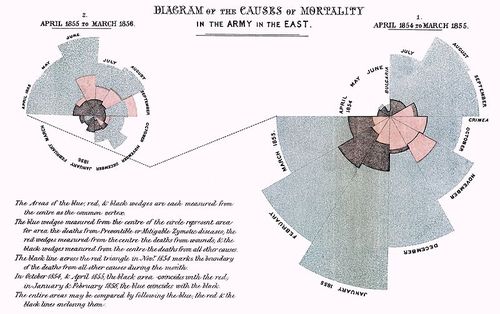This week we are excited to announce the launch of a data visualisation competition (and workshop), sponsored by the AHRC and BBSRC
We talk quite a lot about data on the Science Blog and have previously highlighted the role we are playing in helping researchers to discover, access or cite scientific data. But working at the British Library means we have the fantastic opportunity to bring our collections and contemporary research to the wider public through our exhibitions. Earlier in the year we gave you a taster of Beautiful Science - an exhibition launching in February 2014, that will explore scientific data visualisation from past to present. Some famous historical names, such as Florence Nightingale, knew the power of displaying data – her iconic diagram (pictured) not only enabled any viewer to quickly grasp the meaning but led to changes in the way those injured in war were treated.

As part of our celebration of all things data and our exhibition, we have been working with the Arts & Humanities Research Council and the Biotechnology & Biological Sciences Research Council on a competition that challenges entrants to bring UK Research Council data to life. An added bonus - we hope - is that the competition aims to encourage people from different disciplines to work together, since presenting complex data not only requires mathematical, computing or scientific skills but strong expertise in art and design. A key criteria for the judges will be whether the entries convey the meaning to a wide audience and so they will be looking for that combination of valid data that tells a compelling story.
Around £3 billion of Government funding is apportioned annually between the seven UK Research Councils, which are responsible for different discipline areas. The Research Councils then distribute that funding to their various communities on the basis of applications made by researchers, which are subject to independent, expert peer review. Applications are judged by considering a combination of factors, including their scientific excellence, timeliness and promise, strategic relevance, economic and social impacts, industrial and stakeholder relevance, value for money and staff training potential. Until recently it wasn’t easy to combine funding data from different Research Councils or to explore how it was distributed across the country. And the finer grained detail, while it may have been available from an individual Council, was difficult to tease out or integrate. Behind the scenes, Research Councils worked together to make details of the research they fund available from one place. The culmination of that commitment is Gateway to Research - a database that anyone can use. The data is available programmatically and under an open government licence which means that anyone is free to interrogate it – you can extract it all, download it to your own systems, apply your own analysis tools and generally think of things to do with it that no one else has done before.
The challenge of the competition is to use the Gateway to Research data to tell a compelling story that anyone will be able to understand. While designers, graphic artists, software developers and programmers may have a particular interest, anyone and everyone is invited to produce a visualisation (on a website) that will show how this public funding contributes to research in the UK. Details of the competition are here. Entries forms will be available from 27 January 2014 and the closing date is 21 March 2014. Our judges include Jackie Hunter, Chief Executive, BBSRC, Katy Borner, Victor H. Yngve Professor of Information Science, Indiana University and Guardian Digital Agency.
On 24 January 2014, we are holding a workshop at the British Library for anyone who wants to find out more. Please register if you want some inspiration, information about the Gateway to Research database and to meet potential collaborators. Representatives from the AHRC and BBSRC will be there on the day, as well as data visualisation evangelists (Guardian Digital Agency) and developers (Cottage Labs) who have worked with the data. We will also have Andrew Steele from Scienceogram who is using public data to make the case for science in the UK.
Lee-Ann Coleman
Stuart Smith (BBSRC intern, 2012)
Rachel Huddart (BBSRC intern, 2014)